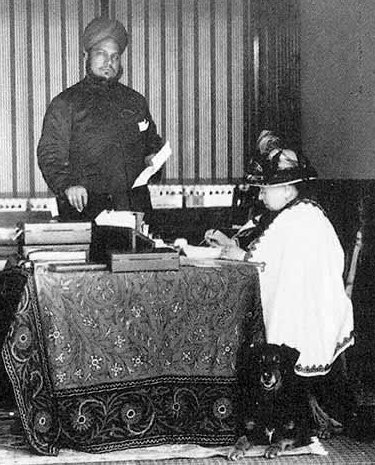by Susan Flantzer © Unofficial Royalty 2018

Portrait of Abdul Karim by Rudolf Swoboda, 1888; Credit – Wikipedia
Abdul Karim, known as the Munshi, was Queen Victoria’s Indian attendant 1887 – 1901.
Abdul Karim was born in 1863 in Lalitpur in British India now in the Indian state of Uttar Pradesh. His family was Muslim and his father was a hospital assistant with the Central India Horse, a cavalry regiment of the British Indian Army. Karim had one older brother and four younger sisters.
Karim first worked for the Nawab of Jaora, a princely state of British India. Three years later, Karim moved to Agra where his father was then working as a clerk in the Central Jail and was then also employed as a clerk in the jail. In Agra, Karim made an arranged marriage with the sister of a co-worker.
The prisoners in the Central Jail in Agra were trained as carpet weavers. In 1886, for the Colonial and Indian Exhibition in London, a contingent of prisoners was sent to be living exhibits, demonstrating their carpet weaving skills. Karim did not accompany the prisoners but he was instrumental in organizing the trip. Queen Victoria, who visited the exhibition, had a deep interest in India and wanted to have two Indian servants for her Golden Jubilee year. She asked John Tyler, the superintendent of the jail who had accompanied the prisoners to London, to recruit two Indian servants. Karim and Mohammed Buksh were selected and were given instruction in the English language and British customs.
Karim and Buksh arrived at Windsor Castle in June 1887 and expected to be serving at the table while learning other tasks. They first served breakfast to Queen Victoria at Frogmore House at Windsor on June 23, 1887. Describing Karim in her diary for that day, Victoria wrote: “The other, much younger, is much lighter [than Buksh], tall, and with a fine serious countenance. His father is a native doctor at Agra.” Victoria took an instant liking to Karim and ordered that he be given additional instruction in English. During the summer of 1887, she asked Karim to teach her Urdu, Karim’s native language, and Hindustani.

Karim and Queen Victoria in 1893; Photo Credit – Wikipedia
By 1888, Victoria decided that Karim was of a much higher class. She knew Karim had been a clerk in India and mistakenly believed his father was an army medical doctor. Therefore, she thought it was unsuitable that he wait on tables. Karim was appointed to the position of Munshi (teacher) with secretarial duties. Mohammed Buksh, who had come to England with Karim, remained in Queen Victoria’s service as a table servant until his death in 1899.
Over the years, other Indian servants came, sometimes along with their families including Karim’s wife. Karim’s position in the royal household was resented by the other Indian servants but it paled in comparison to the disgust felt by the middle-class and upper-class members of the household and members of the royal family. Queen Victoria expected them to welcome Karim but they were not willing to do so and Karim expected to be treated as an equal. In addition, Queen Victoria refused to believe any negative comments about Karim. This tension continued and worsened over the years.

Karim and Queen Victoria in 1897; Photo Credit – Wikipedia
Queen Victoria died on January 22, 1901. Knowing that his mother would have wished it, King Edward VII allowed Karim to view the Queen he had served in her coffin. However, Edward VII ordered the correspondence between his mother and Karim burned. He then ordered Karim and the other Indian servants back to India.
In 1890, Queen Victoria, knowing she could not trust her family or the royal household to take care of Karim after her death, had arranged for a grant of land in the Agra suburbs to be given to him. Karim had purchased an adjacent piece of property in 1898 and combined it into an estate which made him a wealthy man. He lived the rest of his life peacefully and was even visited in 1905 by the future King George V, then Prince of Wales. In April 1909, Karim Abdul died at his home Karim Lodge at the age of 46. He was buried in a mausoleum at the Panchkuin Kabaristan Cemetery in Agra beside his father.
King Edward VII ordered that Karim Lodge be searched for any correspondence between Karim and Queen Victoria or members of her household and that the letters be confiscated and sent to him. Due to a strong disapproval of the seizure of the letters by members of the colonial Indian government, some of the letters were returned to Karim’s heirs, his nephews and great-nephews. Karim’s family had possession of Karim’s diary and made the letters and the diary public in 2010.
This article is the intellectual property of Unofficial Royalty and is NOT TO BE COPIED, EDITED, OR POSTED IN ANY FORM ON ANOTHER WEBSITE under any circumstances. It is permissible to use a link that directs to Unofficial Royalty.
Works Cited
- “Abdul Karim (The Munshi)”. En.Wikipedia.Org, 2018, https://en.wikipedia.org/wiki/Abdul_Karim_(the_Munshi). Accessed 7 June 2018.
- Baird, Julia. Victoria The Queen. Random House, 2016.
- Erickson, Carolly. Her Little Majesty: The Life of Queen Victoria.Simon and Schuster, 1997.
- Hubbard, Kate. Serving Victoria: Life In The Royal Household. Harper Collins Publishers, 2012

